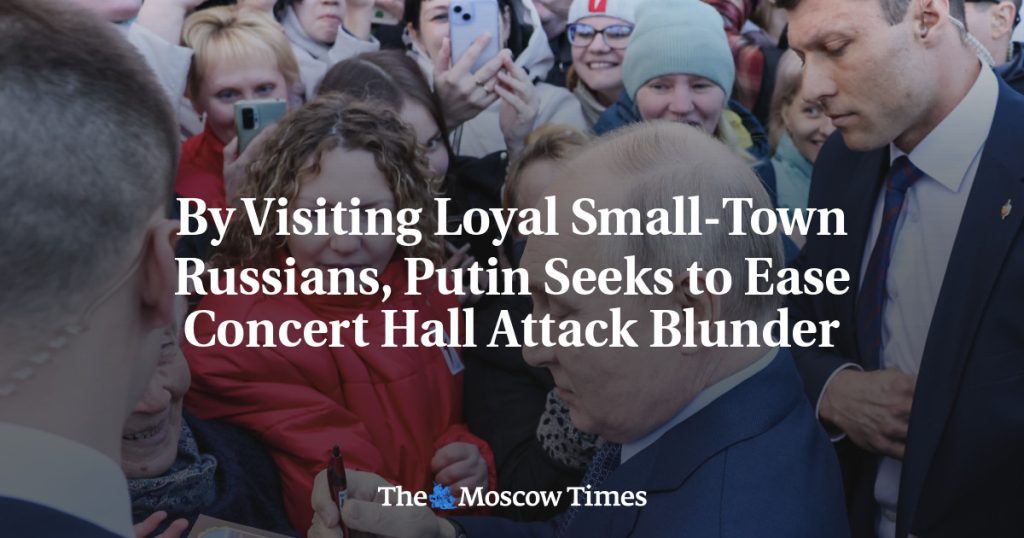In the aftermath of the deadliest attack on Russian soil since 2003, President Vladimir Putin has been criticized for not visiting the site of the attack in Moscow or meeting with the victims’ families. Despite the Islamic State claiming responsibility for the attack, Putin has continued to implicate Ukraine and the West. In a surprising move, Putin made a visit to Torzhok, a small town in the Tver region, where he was greeted by a pre-arranged crowd of locals, who warmly welcomed him. The televised footage showed Putin interacting with the crowd, signing an elderly woman’s book, and kissing a young boy, surrounded by bodyguards.
The attack at Moscow’s Crocus City Hall resulted in the deaths of at least 140 people and left 360 others wounded, exposing a major failure in Russia’s security apparatus. In an attempt to manage the fallout from the attack, Putin employed his usual tactic of staging spontaneous meetings with ordinary citizens far from the capital. This visit to Torzhok was intended to portray Putin in a favorable light and show that the Russian nation supports him. The staged reception included hours of waiting by the crowd, which also featured what appeared to be undercover security officers among the attendees.
The Kremlin’s strategy of positive spin was evident during Putin’s previous interactions with citizens, such as a meeting with soldiers’ mothers following Russia’s failed attempt to capture Kyiv. Another example was when Putin visited Dagestan after the Wagner Group mutiny, where he was warmly greeted by assembled supporters despite ongoing domestic security challenges. These orchestrated gatherings have been used as a way to deflect criticism and demonstrate public support for Putin. The Kremlin has repeatedly used staged interactions during visits to different regions following events that could provoke public anger.
The visit to Torzhok was met with skepticism, given the recent events in Moscow and the ongoing funerals of the attack victims. The town was prepared for Putin’s arrival with covered-up buildings, removed speed bumps, and a significant police presence. Despite claims that the visit had been planned earlier and postponed due to the attack in Moscow, there were doubts about the authenticity of the interaction. The Kremlin’s attempts at damage control through staged events and interactions with citizens have been criticized as manipulative and aimed at bolstering Putin’s image amid crises and challenges faced by the government.
The Kremlin’s use of staged interactions and events as a public relations strategy has been a recurring theme in response to various crises and challenges faced by the Russian government. This strategy has been deployed after military setbacks, domestic security crises, and other incidents that could potentially damage Putin’s reputation. The use of staged visits to different regions, such as Torzhok and Dagestan, aims to create a narrative of public support and portray Putin as a beloved leader, despite mounting criticism and challenges. The Kremlin’s tactics of positive spin and orchestrated interactions with citizens are part of a broader strategy to maintain Putin’s popularity and deflect attention from critical issues facing the government.


